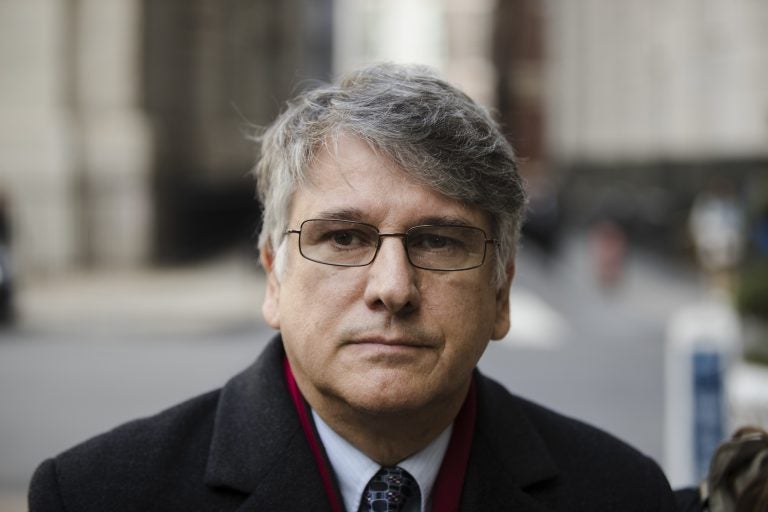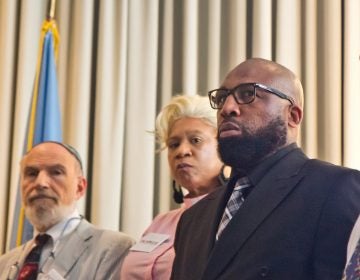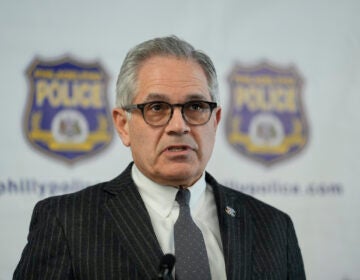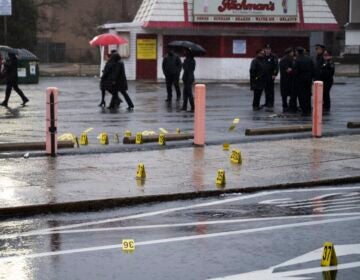Sex-abusing doctor’s patients: No justice in Philadelphia; is this a coverup?
A slew of patients who accuse Dr. Ricardo Cruciani of sexual misconduct in Philadelphia have yet to see authorities pursue a felony case against him.

In this Nov. 21, 2017, file photo, neurologist Dr. Ricardo Cruciani walks from the center for criminal justice after pleading guilty to misdemeanor charges that he groped women at a clinic in Philadelphia. (AP Photo/Matt Rourke)
Patients of a neurologist facing rape charges in New York and New Jersey are calling on Pennsylvania’s attorney general to look into possible felony charges against the doctor after his accusers say prosecutors in Philadelphia have turned away from evidence that would hold him accountable.
“It’s startling to me that Philadelphia, unlike New York and New Jersey, would completely dismiss our stories,” said Hillary Tullin, 46, who saw Dr. Ricardo Cruciani for years and said she was assaulted repeatedly by him in all three states. “Certainly there is something that is being covered up.”
Eighteen women in Philadelphia have accused Cruciani of sexual misconduct and have yet to see authorities pursue a felony case against him — even after police in New York City and New Jersey investigated their claims and swiftly filed charges.
Prosecutors in Philadelphia last year charged Cruciani with counts of groping, and he agreed to a plea deal that included seven years’ probation, registering as a sex offender and surrendering his medical license. Some of his victims characterized that punishment as a slap on the wrist.
“They seem perfectly comfortable with allowing a dozen and a half women to sit here feeling as if their voices don’t matter and feeling as if they have been completely revictimized,” Tullin said in an interview with WHYY Tuesday.
The Ivy League-trained neurologist faces a total of 30 criminal counts in New Jersey and New York. He has pleaded not guilty and is free on $1 million bail.
In Philadelphia, prosecutors say evidence against the disgraced doctor is too weak to support rape charges, despite nearly identical accusations prompting authorities in two other jurisdictions saying otherwise. Other complaints, meanwhile, are still under investigation.
“They did voice their frustration about our decision not to charge. We understand and are sympathetic to that frustration,” said Philadelphia District Attorney Larry Krasner spokesman Ben Waxman. While we believe their disclosures, we are unable to meet our burden in this jurisdiction.”
Tanisha Johnson, one of six patients interviewed by The Associated Press about their experience with Philadelphia law enforcement, said she called police multiple times in a fruitless effort to schedule an interview. She recalled a particularly distressing March conversation with a supervisor in the special victims unit.
“What he said to me was, ‘The case in Philadelphia has already been dealt with. I suggest you contact New York and New Jersey.’ My response was, ‘You want me to contact New York and New Jersey about a crime that took place in Philadelphia?’ I was offended by that,” Johnson said.
Capt. Sekou Kinebrew, a police spokesman, said the department doesn’t comment on conversations between accusers and special victims unit investigators.
“It was disheartening, and it was disrespectful, and I was disregarded,” said Johnson, 43. “When I hung up the phone, I cried for about three hours. I can’t believe that’s the way you would deal with a victim of rape.”
Johnson said she eventually managed to give a statement, but only after she traveled from her home in New York City to Philadelphia and went to the DA’s office unannounced.
Cruciani arrived in Philadelphia two years ago as a heralded pain doctor. As chief neurologist at Drexel University’s medical school, he saw patients with rare, complicated syndromes and chronic, unrelenting pain.
His accusers say Cruciani used that specialized medical knowledge to trap them in long-term doctor-patient relationships marked by abuse, taking advantage of their desperation. Some of the women say Cruciani forced them to have intercourse and perform oral sex and penetrated them with his fingers.
A 55-year-old woman who alleges Cruciani abused her for years told the AP that she gave a statement to Philadelphia police in late 2017 but has heard nothing since. The woman said police in New York and New Jersey responded immediately, communicated with her each step of the way and charged Cruciani based on her account.
“There was already so much misery and shame going on, and to have to go through all this is just ridiculous,” the woman, who lives in Dutchess County, New York, said of Philadelphia law enforcement. “Did they not take me seriously? Were they trying to cover it up? All these things go through your head when you’re ignored. I was so ignored.”
The Associated Press does not typically identify people who say they are victims of sexual assault unless they grant permission, as Tullin and Johnson have done.
In Philadelphia, a total of 18 accusers have filed police reports since May 2017, including 10 who came forward after his arrest in September, according to the police department.
Philadelphia police routinely buried rape cases in decades past, a practice exposed by The Philadelphia Inquirer in 1999. The scandal prompted major reforms, including an annual, confidential review of police sexual assault files by outside advocacy groups.
A former prosecutor not associated with the case said he is perplexed by Philadelphia’s handling of the Cruciani cases.
“I would find it surprising, regardless of whether he was charged in another jurisdiction, that if they have multiple, overlapping, credible victims who want to see this man prosecuted, that charges wouldn’t be filed,” said Dave Zuckerman, a Pittsburgh defense lawyer and former assistant district attorney. “To me, that is not customary.”
Tullin is outraged the DA’s office declined her case. She said a prosecutor cherry-picked two statements in a police interview to wrongly imply she had consented to sex acts with Cruciani.
“It was the very first interview I ever did. I didn’t have an advocate, I had never talked about this with anybody, I hadn’t seen a trauma counselor. You’re saying things that sometimes don’t make sense,” Tullin said. “And what I was saying was taken out of context.”
New York and New Jersey police both charged Cruciani based on her account.
Waxman, the spokesman for Krasner who took office in January, declined to comment on the specifics of each accuser’s case. In general, Waxman said, “the ones where we didn’t charge are ones where we feel we didn’t have a strong enough case.” Prosecutors, he added, “don’t have the tools” to file charges in some instances.
Pennsylvania and New Jersey sexual assault laws do not specifically address conduct by health providers, though each state’s licensing board prohibits doctors from having sexual contact with their patients, even if it’s consensual. In New York, patients are deemed incapable of consenting to sex with their doctor during treatment or an exam.
“These women put their faith in Dr. Cruciani as their doctor, which he betrayed. These women have since put their trust in the police and DA’s office to fully investigate and prosecute these crimes and are outraged that no additional charges have been brought against Cruciani, or that they were told to seek justice in other states although the crimes took place in Pennsylvania,” said Jeff Fritz, an attorney for many of the accusers.
Tullin, a former network news producer for ABC and CBS, said that at a 2005 appointment, the neurologist grabbed her face and jammed his tongue down her throat. She says she uttered an expletive and fled.
She avoided going back for a couple weeks; eventually, she returned, feeling she had no choice because Cruciani was one of the very few doctors who could treat her. After that, she says Cruciani attacked her at least a dozen times. Tullin has told the Associated Press that Cruciani touched her breasts and genitals, and that she performed oral sex on him at his request and he performed it on her.
“If you want to tell me that you think the abuse that I suffered was consensual, well it wasn’t, but if you want to tell me that?” Tullin said in an interview with WHYY. “But what are you going to tell the 17 other women? The exact same thing? That just doesn’t fly.”
WHYY is your source for fact-based, in-depth journalism and information. As a nonprofit organization, we rely on financial support from readers like you. Please give today.




